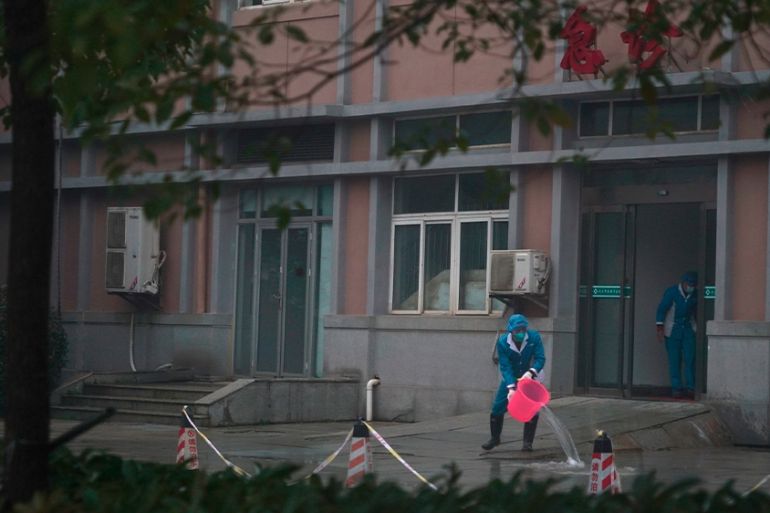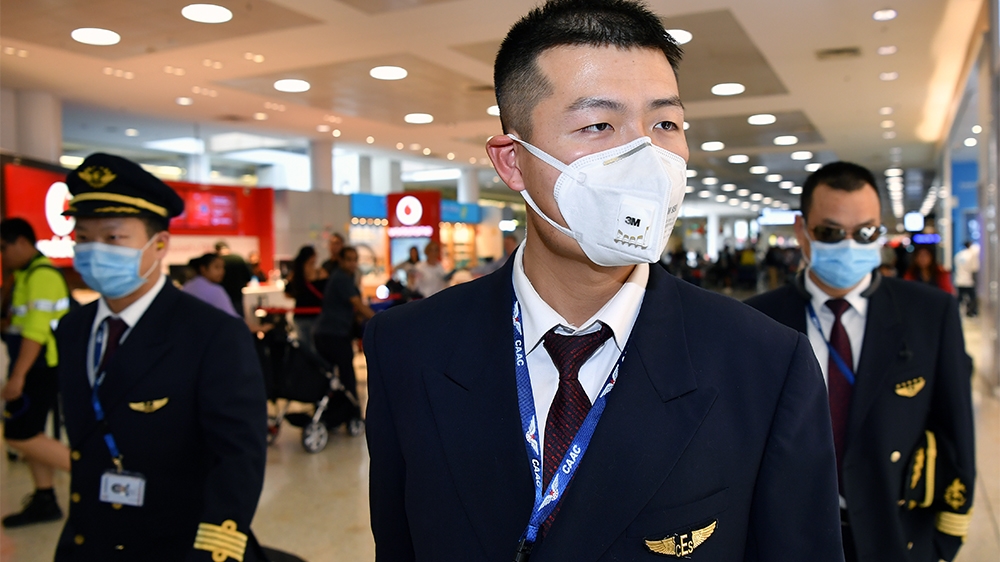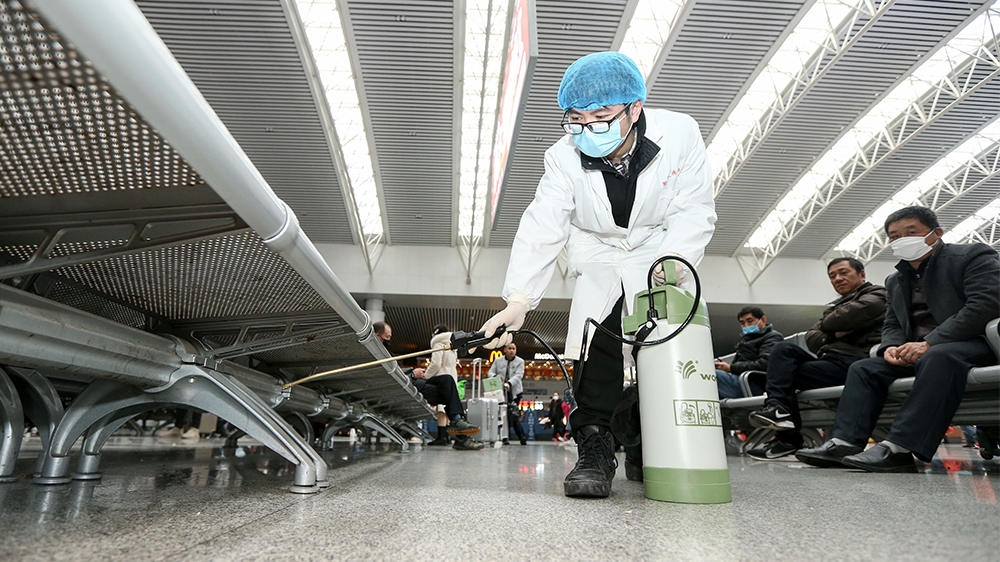Concern grows about deadly virus in rural China as Wuhan sealed
As Wuhan is sealed off, and the death toll rises, people in rural China worry they are vulnerable to the coronavirus.

Dazhu, China – The public security bureau in the rural town of Dazhu in China’s northeast Sichuan province is bustling ahead of the Lunar New Year with families from larger cities on the east coast getting passports, travel passes and other documents updated while they are back in their hometown.
Despite the outbreak of the coronavirus that started in the central city of Wuhan in December, only a few people visiting the bureau could be seen wearing masks and only one or two of the dozens of the bureau officers were wearing theirs or had them hanging around their necks.
Keep reading
list of 4 itemsCould a bird flu pandemic spread to humans?
Family says al-Shifa doctor was tortured to death in Israeli prison
Measles outbreak kills at least 42 people in northeast Nigeria
“We’re concerned, but there’s not much we can do right now,” said Ms Wang, an officer who preferred her full name not be used. “We’ve had locals who live in Wuhan coming through the office, but there’s really no way for us to tell if there’s a problem.”
Other officers said they were worried about catching the virus but were told not to wear masks unless they were sick themselves so as not to cause panic among visitors.
Dr Maia Majumder, a faculty member of Harvard Medical School, who wrote her dissertation on Severe Acute Respiratory Syndrome (SARS) and Middle East Respiratory Syndrome (MERS), told Al Jazeera that advising against unnecessary mask use was a sensible response for the time being.

For most areas in China, the prevention guidelines are similar to those recommended for cold and flu – washing hands with soap, not sneezing into hands and not touching mucous membranes, she said. They also mirror World Health Organization (WHO) guidance on dealing with coronaviruses.
Questions over response
As of 10am (02:00 GMT) on Thursday, Wuhan stopped all passenger transport out of the city, closing the airport and main railway station. It also started running health checks of passengers in vehicles departing the city, in an effort to contain the still unknown virus.
Those containment efforts, however, may not be enough as the infection has already been diagnosed or suspected in 26 provinces of China, as well as Hong Kong and Macau. Cases have also been confirmed in Thailand, Taiwan, the United States, South Korea, and Japan.
|
|
While the national-level response has been lauded for its openness, at least compared with the SARS outbreak in 2003 that left some 800 dead worldwide, there is growing discontent over how the initial response was handled in Wuhan.
On China’s social media network Weibo there was a flurry of uncensored calls for Zhou Xianwang, the city’s mayor, to step down after he told state broadcaster CCTV that the city’s earlier warnings were not sufficient in containing the outbreak.
And while online discussion of the virus has reached a fever pitch, there was no mention of the outbreak on the front page of the state-run People’s Daily on January 23. Instead, the newspaper had extensive coverage of the work President Xi Jinping and Premier Li Keqiang were doing before Friday’s Lunar New Year holiday.
Online, it published a detailed map of where confirmed and possible cases are in China along with other stories about the outbreak, suggesting the government is still trying to balance how to communicate the severity of the crisis without creating a sense of panic, particularly during what should be a celebratory time of the year.
To reduce risk of #coronavirus, Practice #FoodSafety!
🛑Use different chopping boards and 🔪for raw 🥩 and cooked food
🛑Wash your 👋 when preparing meals
🛑Make sure 🥩🍖🍗 meat products are cooked thoroughly and properly handled pic.twitter.com/QXj4dfgney— World Health Organization Western Pacific (@WHOWPRO) January 23, 2020
On Wednesday, Li Bin, Vice Minister of National Health Commission, attempted to allay fears of a wider spread of the outbreak and signalled the government was trying to contain the infection in Wuhan and Hubei province as much as possible.
“We believe that under the leadership of Xi and the excellence of the socialist system, along with our experience of SARS and the support of the people, we have confidence that we shall prevail over the disease,” Li said at a briefing.
Moving forward, Li said, supervision of wet markets would be enhanced and controls on the sale of wild animals – the virus is suspected to have come from wildlife that was being sold at the Wuhan market – would be strengthened.

Authorities would also concentrate on temperature screening and sanitation at public transport hubs around the country, he said.
‘At the mercy of the virus’
Mujumder said she was personally impressed with the data that had been made available by Chinese authorities since the outbreak occurred.
“There’s always room for improvement, but this early into the game, I appreciate the level of transparency we’re already seeing, including from the Wuhan Municipal Health Commission,” she said.
Effective and reliable communication would be crucial in the coming days, she said.
“If there’s heat between the public and its authorities, that’s an important consideration because it may translate into mistrust in the healthcare system,” Mujumder said. “Trust in governing bodies is crucial in times like these.”
As for masks, Majumder explained that too little was known about the size of the virus to determine what kind of masks should be used.
“From what I can tell, it’s likely that folks who don’t actually need surgical masks are buying them up unnecessarily – so it’s important to communicate under what conditions those masks make sense to wear,” Majumder said.
Masks appear unavailable in many areas, with several stores in Dazhu out of stock.
At the Foshan railway station in southern China’s Guangdong province, passengers were rushing for trains to get home for New Year, which officially starts on Friday. About half the people moving through the station were wearing masks.
On a train bound for rural Hunan, Mr Su, a manager at a factory in Chaozhou in the east of the province who did not want to give his full name, sat unmasked and resigned to whatever fate had in store.
“I wasn’t fast enough to realise the outbreak was so bad, so I haven’t been able to find any masks,” the 36-year-old, said.
“You have really no choice, you’re at the mercy of the virus. If it’s bound to happen to you, it happens, even with masks.”
With additional reporting from Zhong Yunfan in Foshan.